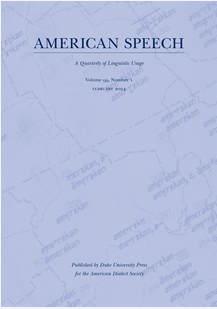-
Partager cette page
“I’ve Always Spoke Like This, You See”: Preterite-to-Participle Leveling in American and British Englishes
Publié le 23 avril 2024 – Mis à jour le 23 avril 2024
Alicia Chatten; Kimberley Baxter; Erwanne Mas (CLLE); Jailyn Peña; Guy Tabachnick; Daniel Duncan; Laurel MacKenzie

Some English verbs use distinct forms for the preterite (i.e., simple past; e.g., I broke the door) and the past participle (e.g., I’ve broken the door). These verbs may variably show use of the preterite form in place of the participle (e.g., I’ve broke the door), which the authors call participle leveling. This article contributes the first detailed variationist study of participle leveling by investigating the phenomenon in perfect constructions using data collected from three corpora of conversational speech: two of American English and one of British English. A striking degree of similarity is found between the three corpora in both the linguistic and the extralinguistic constraints on variation. Constraints on participle leveling include tense of the perfect construction, verb frequency, and phonological similarity between preterite and participle forms. The variable is stable in real time and socially stratified. The article relates the findings to theoretical linguistic treatments of the variation and to questions of its origin and spread in Englishes transatlantically.
- Accueil
- Présentation
-
-
Langues et langage
- Structures LInguistiques: Modèles, Variations, usages
- OCcitan, langues Romanes, langues d’Europe : décrire, formaliser, outiller, comparer
- Didactique du français et des langues, Linguistique située, Formation des enseignants
- Discours
- Processus Langagiers & Cognitifs
- Outils Numériques : aspects cognitifs et langagiers
- Education & Apprentissage
- Multimodalité, Variation, Culture
- Cognition en Situation Complexe
-
Langues et langage





